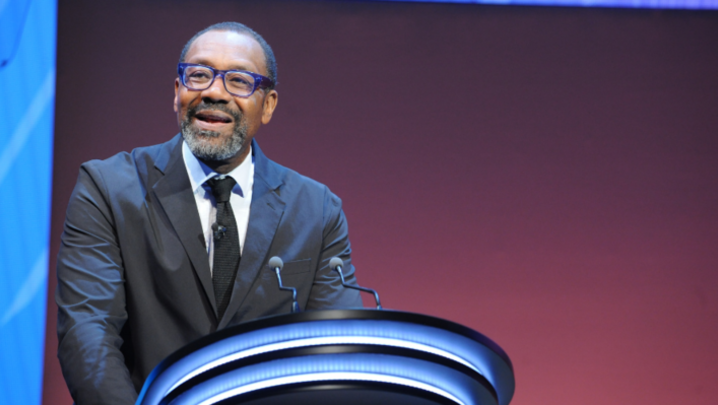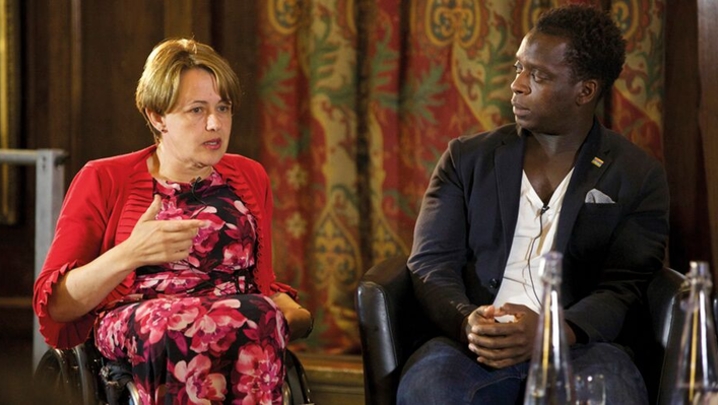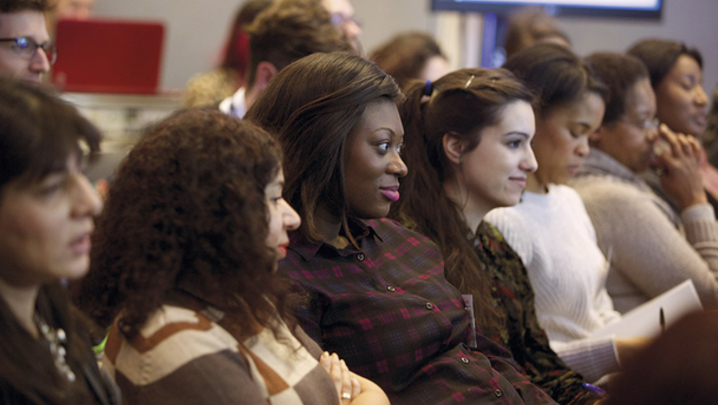Andrew Billen hears how ScreenSkills CEO Seetha Kumar defied the BBC’s ‘glass cliff’ to reach the top
It is the best of times: the television business is booming. It is the worst of times: there is a skill shortage, so wage costs are soaring. Yet shouldn’t that make it the best of times again? Won’t television be forced to find and train a new generation of programme-makers who won’t all be white and middle class? This, I tell Seetha Kumar, the ambitious chief executive of ScreenSkills, is a battle she can win.
“You make it sound so simple,” says Kumar. She is in her office close to Euston station where her skills-body charity works to ensure that film and television find the people to make the magic happen. She has been telling me how the industry needs to think through a new “skills pipeline”, scrape the opacity from its gateways, end the biases that exclude and, before all that, nurture a “whole-child” approach in schools, where creativity and technical skills are meshed, rather than divided.
So she still thinks it could all go wrong? “No, I hope that you’re right. I think we should win. There is a genuine economic and social purpose to effect change in our industry, and we have a moment in time to do it. I just think, as always – and I say this to people internally – anything worthwhile and challenging is never easy.”
The difficulties in Kumar’s own career in television, since she moved from India to London in her twenties, become a big, knotty strand in our interview. It was certainly not the best of times when, in 2015, Kumar, a former 20-year BBC staffer, was headhunted from the educational publisher Pearson to run what was then known as Creative Skillset.
It was, she says, “a perfect storm”. The advent of multichannel, tax breaks, rising demand for high-end drama and the imminent arrival of the streamers had created a production boom in television. At the same time, over the years, the BBC had less and less money for training, and, although people delivered homilies about “inclusion”, it was never a “powerful driver” in recruitment.
And then there was Creative Skillset itself, set up by the screen industries back in 1992 as just plain Skillset. Under the post-1997 Labour governments, it had received consistent government funding. The David Cameron-led coalition replaced that with project funding and, by 2015, when Kumar arrived, even that had only two years left to run.
“We had a brilliant board, and the board wanted change,” says Kumar, the first BAME woman to receive an RTS Fellowship, “but I genuinely wasn’t entirely aware that (a) the project funding was going to end, or (b) that internally there was a problem that some of the contracts hadn’t been paid for a period of time.”
Contracts? “From the Government. There was a hiatus in payment.”
The Government hadn’t signed the cheques? “There was a hiatus, OK? I’m going to put it very politely.”
So her first instinct was clearly to resign? “Weirdly, I’m not a quitter. I had worked in big corporates most of my life, so this was a very different experience. When I first arrived, I was a bit like, ‘OK, what’s going on?’. I was shocked, I have to be honest.”
The other problem was that Creative Skillset’s canvas had became too broad. It was working in sectors such as advertising, publishing and fashion. Kumar rechristened it ScreenSkills and refocused it so that it targeted – well, screens. Throughout 2017, staff left and were not replaced but, at the end of the year, ScreenSkills won a £19.5m contract from the BFI and appointed a dynamic new head of film, Gareth Ellis-Unwin.
So all is well now? “It’s not as simple as that. ScreenSkills got through the hump and we are rebuilding. I think it’s got good industry support, brilliant skills councils and we can track exactly what we do. However, if we’re going to change our industry seriously and get it to grow and stay growing, particularly in key hubs across the nation’s regions, we need a 10-year plan for skills and talent – and I think we should lead it.”
The funding facts are these. When Kumar arrived, the organisation was funded to the tune of £28m, the majority coming from government, with £5.3m from the BFI and £3.5m from industry. This year, the total is just £13.3m (£6.8m from industry; more than £5m from the BFI; and some cash from other sources, including from Arts Council England and, unusually, £500,000 from DCMS to run a specific creative careers programme, but that goes next year).
And on diversity? “I just think, across the piece, if you look at the research that Ofcom has done, that we are making very slow strides.”
Is the industry racist? “I don’t think the industry is racist. There are incidents where people have behaved in a racist way, they have bullied or behaved unpleasantly, but I would say it’s unfair to say the industry is racist. It’s not.”
It just mirrors itself? It’s attracted to what it recognises? “That’s a human instinct.”
There is now a consensus that the market, as well as justice, demands more opportunities for minorities, yet there is a disagreement over how those opportunities can be created. ScreenSkills identifies skills gaps, provides career information, mentors, trains, offers bursaries and even holds workshops on unconscious bias. At the RTS Cambridge Convention last year, however, Sir Lenny Henry said it was time to scrap diversity schemes and initiatives. He argued, instead, for diversity tax breaks and contestable funds for diverse programming.
“Where I agreed with him is on the multitude of initiatives,” she says. “But for me, the issue is really not to have a plethora of initiatives that will take you anywhere, but to link them back to pathways to where the needs are.
“I’ll give you an example. In unscripted, we’ve been running a series-producer programme and, as of mid-March, we have probably more than 100 alumni. Their progression has been fantastic. Many of them are series producers, if not higher.”
Kumar admits, however: “In my lifetime, even when I was at the BBC, I have seen what I call ‘initiative-itis’. People want to do the right thing. They announce it. They get the press. My big question is: what happens to these people? And what’s the return rate?”
She has two children, both grown-up (neither are in the industry) and was herself brought up in Bombay (she does not call it Mumbai). Her late father worked in government and was cautious about his daughter embarking on anything less than a very respectable career.
Her mother did not work but was well educated and a big reader. She told Seetha something that determined her life: “Do what you love and what you believe in. Nothing else matters.”
After university in New Delhi and a short spell in print journalism, she arrived in London in the 1980s for what she describes as “family reasons”. One plus was that our television was much better than India’s.
“I found England, the UK, not a happy, friendly place. It was London in the mid-1980s. It was tough, so I hoovered up TV. TV was my best friend. I watched everything from Sons and Daughters, which was daytime stuff, to Granada’s World in Action. I thought it was fantastic.”

Television was less keen to hoover her up, however, and she doubts if she would have made it in had she not “so desperately wanted it”. “I applied for every job. I wrote endless letters. Nothing.”
Finally, she got work as a researcher on a programme an independent was making about India. Even that break made her angry: Brits felt they could become experts on India with a little help from a native, but not let an Indian work on a British show.
It was Alex Graham, founder of Wall to Wall, who spotted her tenacity and recommended her to someone at the BBC. She was recruited for a programme on the Bhopal gas disaster, but it was a short-term contract and it was India again. Happily, the producer, Elizabeth Clough, promised it would lead to greater things and kept her promise. Kumar moved to Taking Liberties, the series that investigated miscarriages of justice.
Her BBC career thenceforth looks, at least on paper, spectacular. She was editor of Crimewatch UK and is credited with holding the team together when its presenter, Jill Dando, was murdered. In 2003, she ran the domestic abuse season Hitting Home and, two years later, executive-edited the award-winning, cross-media season Africa Lives.
She launched BBC HD and then switched, in 2008, to lead BBC Online, where she revolutionised the measurement of user consumption. She left the corporation, which she still loves, in 2010 as one reorganisation too many loomed. Pearson offered her a job that addressed her passion for education.
“But it was bumpy,” she says of her BBC decades. “It felt quite lonely. You could ask the same of somebody who was white whether they felt the same. Who knows? I just felt that personally. But I got a reputation for delivering. So sometimes things came my way because they knew I would make sure it worked, whether it was HD or online.”
Despite the support of Lorraine Heggessey, Jane Lush and Mark Thompson, she could feel the lack of a sponsor.
“And also, sometimes, I think the BBC could have been braver in taking more risks with me. They gave me jobs that were what I call ‘glass cliff’.”
What does that mean? “It says you’re at the edge of the cliff and it’s glass, so it could crack.”
They wanted her to fail? “No, but the jobs had a high risk of failure. They did not want me to fail. If anything, I should take it as a compliment. The point is, as a person, as a creative, do you only want to do those [kinds of] jobs?”
And then there was the condescension. “I remember somebody saying to me once, ‘It’s quite extraordinary that you managed to achieve what you have when you have crossed the oceans and the divide.’ I just thought, ‘What the hell?’”
Who was that? “Somebody at the BBC. Someone senior.”
Patronising? “Really patronising, extraordinary comments. I remember someone else lecturing me about diversity, a white man, and I just said: ‘I’ve lived it.’ But I thought: ‘How dare you?’ However, at the end of the day, you’ve got a limited amount of energy; you use it positively or negatively. Negative energy never wins.”
She asks whether I would feel upset if I was told I had “come a long way”. I say I am not sure. “I guess it depends if you’d already fought every step of the way and felt quite bruised and raw. When I joined there weren’t many people who looked like me. I would say, to be fair to most people, some of it is also about how I felt because I was the outsider.”
Kumar left Pearson after three years, unconvinced of its strategic direction (she was right – profits have fallen as students have fled the printed word) but mainly because of the pull of television and her desire to be of use to it.
“I realised that, actually, I really, really, missed this world, which was a wonderful thing to know.”
I ask if she wore a sari after she came to London. She says she didn’t, partly because she wanted to fit in. Nowadays, the richness of her life is to feel British and Indian at the same time.
As to where her spiritual home is, there is no doubt in my mind: it’s television, and she wants it crowded with talent.






